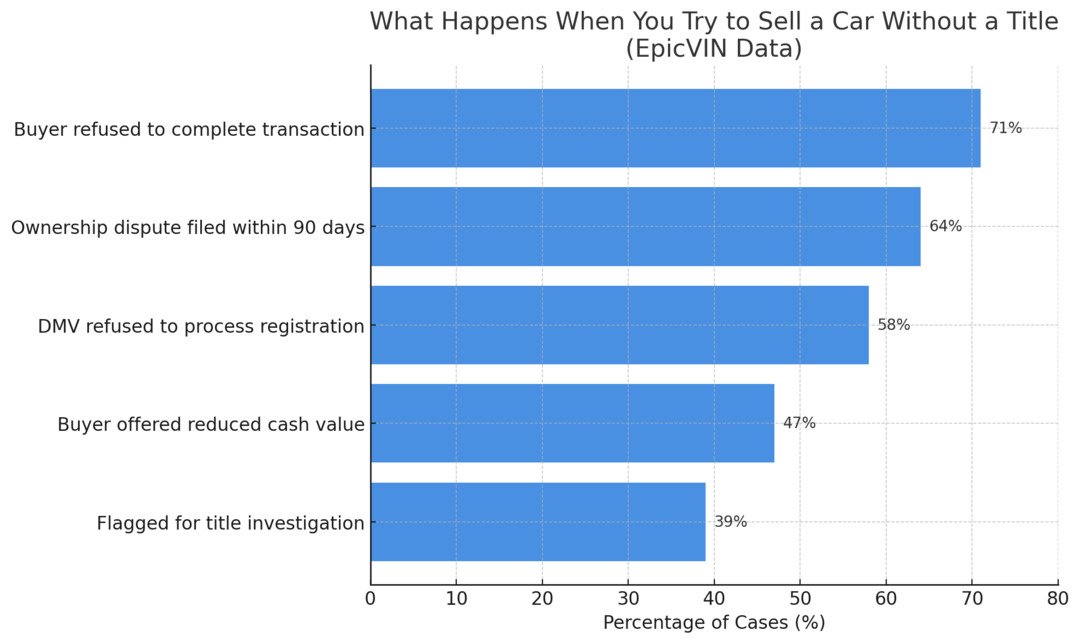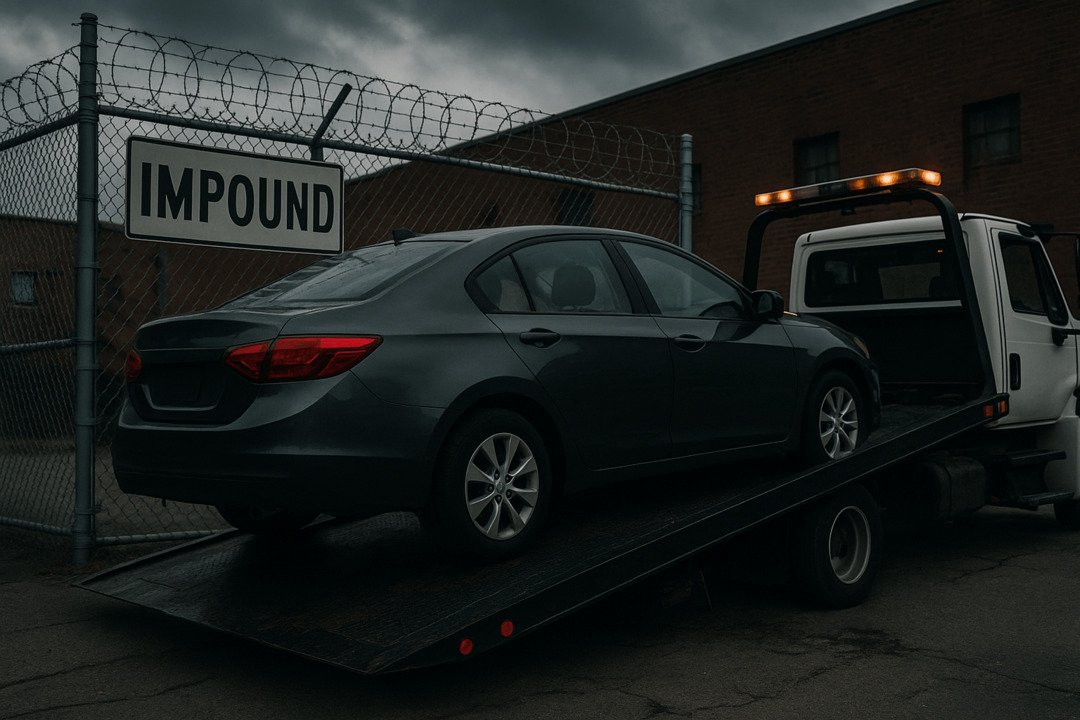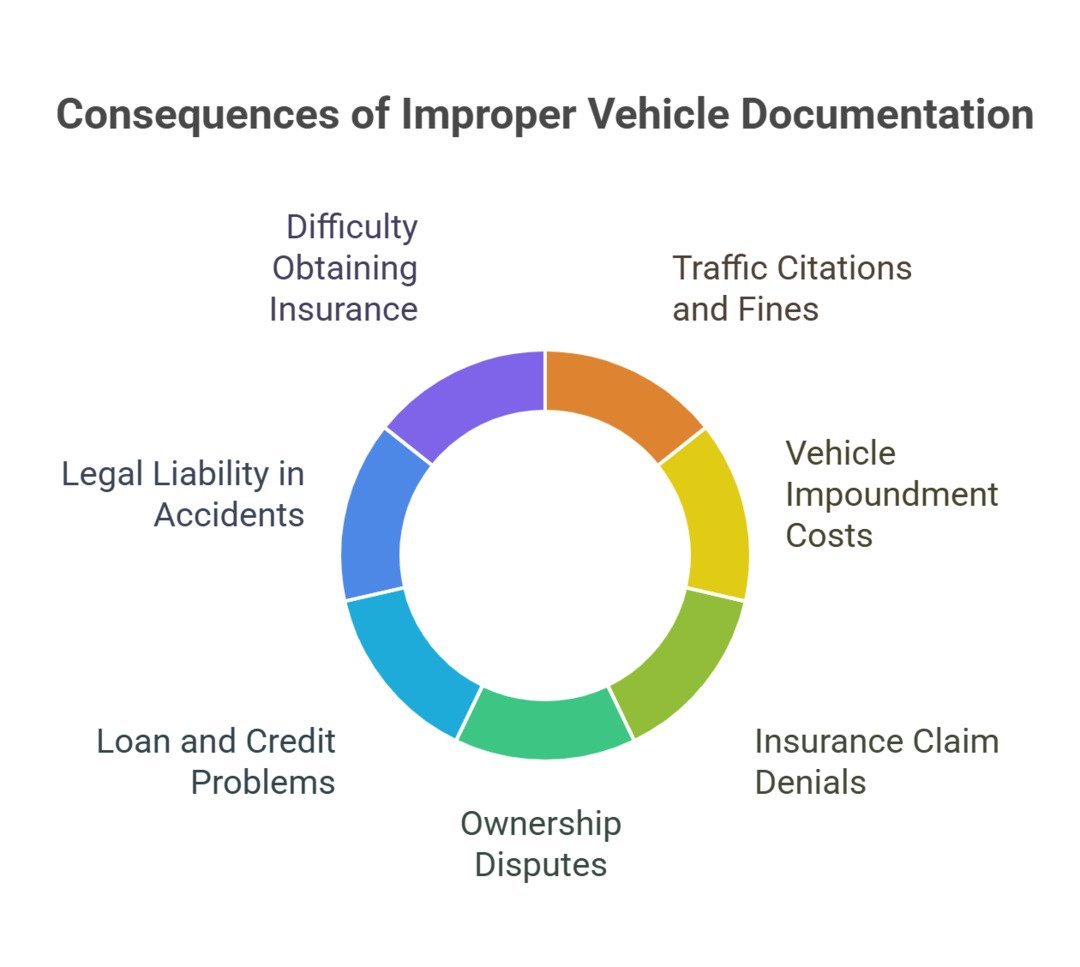Trying to understand the car title vs registration difference? These important pieces of paperwork serve distinct purposes in vehicle ownership. A car title confirms you possess a car. Registration allows you to legally drive on public roads. Many people confuse these legal document types. However, each has specific legal functions that affect your ability to own, register, and operate your vehicle.
Definition of a Car Title
A car title is a legal document. It proves that you own the vehicle. When you purchase a new vehicle or a used car, the state's DMV issues the corresponding paperwork. It uncovers essential details about the vehicle and the owner. Most importantly, it shows car legal owners. The car title document helps you provide proof that you own the car. It’s helpful for car insurance claims. Moreover, it’s irreplaceable when selling the vehicle or resolving vehicle title disputes.
Key information on a car title includes:
- The car's vehicle identification number (VIN).
- The car's specs – model, make, and year of the vehicle.
- Legal owner's name and address.
- Lien information if you have a loan.
- Title number for identification.
- Date of issue and any history.
Definition of Vehicle Registration
Vehicle registration is the official process of recording a vehicle with a state’s Department of Motor Vehicles (DMV). When you register your vehicle with the DMV, you receive a car registration card. Additionally, you get a license plate. This process proves you've paid the required fees, including sales tax. Your vehicle now meets safety and emission standards and can be driven on public roads. Registration must be renewed periodically. Some states require either annual or twice-per-year renewals. Remember that registrations expire on specific dates. Thus, renew them in time for the documents to remain valid.
Vehicle registration typically includes:
- Owner's name and current address.
- Vehicle description and VIN.
- Title number on registration for cross-reference.
- License plate number assignment.
- Registration expiration date.
- Proof that the required fees were paid.
- Insurance verification requirements.
Do You Need Both a Title and Registration?

Yes. You need both a title and registration to legally own and drive your car. The title proves you own the vehicle, while registration permits legal operation on roads. Missing either of them can create serious legal and financial problems for any driver.
Hidden Car Title Issues That Can Block Registration
Several title problems can be serious barriers. These issues often surface during the DMV process and require resolution before you can complete registration. A complete car title check can help identify these problems early. Many drivers discover these issues only when they attempt to obtain a clear title history from the previous owners or search vehicle history records, leading to significant delays and unexpected costs.
| Issue Type | Description | Resolution Method |
| Outstanding Lien | Previous loan not properly released | Contact the lender for lien release |
| Title Washing | The title moved between states to hide problems | Vehicle history report and VIN decoder check |
| Salvage/Flood Title | Vehicle previously totaled or flood-damaged | Special inspection may be required |
| Forged Title | Fraudulent or altered title paperwork | A law enforcement investigation is needed |
| Missing Signatures | Incomplete transfer signatures | Obtain proper signatures from all parties |
Can You Sell a Car Without a Title or Registration?
Selling a car without a proper title and registration is extremely difficult. Moreover, it’s risky. Most buyers and dealerships require a clear title to complete the purchase. Without a car title record, you cannot prove you own the car legally. Thus, the sale is nearly impossible through legitimate channels. You may find a buyer willing to purchase without proper paperwork and pay in cash. Nonetheless, they'll face significant challenges registering the vehicle.
According to EpicVIN data, 71% of buyers walk away when a vehicle lacks a proper title. Even when a sale goes through, nearly two-thirds end in ownership disputes or DMV rejection. Sellers also report lower offers in 47% of these cases, and 39% of vehicles are flagged for title investigation.

What Happens If the Name on the Title Doesn’t Match the Registration?
The names on your vehicle title and car registration card may not match. This can create legal complications. Such a mismatch can occur after marriage, divorce, or other name changes. As per the DMV's requirements, both your names should appear consistently across all vehicle paperwork.
Common problems from mismatched names include the following:
- Difficulty renewing registration.
- Insurance claim complications.
- Problems during traffic stops.
- Issues when making a deal.
- Potential fraud suspicions.
- Loan transfer complications.
Can You Register a Car Without a Title?

You generally cannot register a vehicle without a valid title or memorandum of title. The title proves ownership, which the state's DMV requires. Some states offer temporary solutions, but you'll eventually need proper title paperwork. The process specifically requires proof of ownership. The title serves as the primary legal record establishing this ownership. Without it, the DMV cannot verify your legal right to register the vehicle. This creates potential liability issues for the state.
Does the Registration Show Who Owns the Car?
Vehicle registration shows who registered the car. Nonetheless, it doesn't always indicate the legal owner. The car title determines true ownership, while registration simply allows operation on roads. These legal documents can have different names in certain situations. E.g., a parent might own the title. At the same time, their child's name appears on the registration for insurance purposes. Being aware of this difference helps avoid confusion, especially when dealing with insurance claims, traffic stops, or legal matters.
The information includes:
- A person responsible for the vehicle.
- Current address for tax purposes.
- Vehicle details and license plate assignment.
- Insurance requirements compliance.
- Fee payment verification.
Digital Titles and Electronic Registrations
Many states now offer electronic car title and registration systems. These digital processes streamline the DMV experience and reduce paper document handling. Electronic systems also improve security. They reduce fraud risks associated with physical paperwork. The transition to digital systems represents a major advancement in vehicle administration. This makes the process more efficient for both consumers and government agencies.
| Feature | Traditional Paper | Electronic System |
| Processing Time | 2-4 weeks | Instant to 24 hours |
| Security | Physical paperwork vulnerabilities | Encrypted digital storage |
| Transfer Process | Mail or in-person consultation | Online completion |
| Duplicate Requests | DMV visit required | Online form submission |
| Verification | Manual inspection | Automated database checks |
Legal Risks of Not Having Proper Title or Registration

Operating without a proper title and registration creates serious legal and financial risks. These important pieces of documentation protect both you and other drivers. Missing paperwork can result in significant penalties/complications. Additionally, driving a car with a lien that hasn't been properly marked can lead to repossession issues and credit problems. Remember that documents can expire and lose their legal validity if not properly maintained.
Major risks include:
- Traffic citations and fines.
- Vehicle impoundment costs.
- Insurance claim denials after an accident.
- Inability to prove that you own the car during disputes.
- Problems with loan payments and credit.
- Legal liability in accident situations.
- Difficulty obtaining car insurance coverage.
What to Do If You Lose Your Title or Registration
Losing your vehicle title or car registration requires immediate action to obtain replacements. The process varies by state, but most Departments of Motor Vehicles offer straightforward replacement procedures. Acting quickly helps avoid complications with insurance, loans, and legal requirements. Many states now offer online replacement services, making the process faster and more convenient than traditional mail or in-person visits.
| Feature | Lost Title | Lost Registration |
| Avg. Replacement Time | 14–30 days (varies by state) | 5–10 business days |
| Online Replacement Availability | Available in 21 states | Available in 42 states |
| Identity Verification | Strict – government-issued photo ID + VIN | Moderate – ID + license plate or VIN |
| Typical Fee Range | $15–$65 | $5–$25 |
| Required Form | Duplicate Title Application (varies by state) | Replacement Registration Certificate form |
| Impacts Loans/Ownership Proof? | Yes – title is the legal proof of ownership | No – does not affect legal ownership |
| Must Be Notarized? | Sometimes – 9 states require notarized forms | Rarely – most states don’t require it |
| Effect on Insurance? | May delay claims, title transfers, or refinancing | Usually none unless registration is expired |
Steps to replace lost paperwork:
- Visit your local DMV office or website.
- Complete the appropriate replacement form.
- Provide identification and vehicle details.
- Pay the required replacement fees.
- Submit any additional required paperwork.
- Wait for the mail delivery of the new paperwork.
- Update insurance and loan companies with new information.
Further reading
Summary
The difference between a car title and a vehicle registration is fundamental. Your car title acknowledges that you own the vehicle. Registration allows legal operation on roads. Both documents require proper maintenance, and losing either can create significant problems. Grasping these essential pieces helps drivers navigate the vehicle ownership process successfully. Protect yourself from costly mistakes – register your car correctly.
Frequently Asked Questions
These records contain personal information. Criminals use this data for identity theft. The paperwork shows your address. This, in turn, makes you vulnerable to burglary. Thieves might know you're not at home.
The vehicle title provides the strongest legal proof of ownership. Additional supporting paperwork can strengthen your claim. Supporting paperwork includes:
- Original purchase paperwork and bill of sale for a car.
- Loan paperwork showing payment history.
- Insurance records in your name.
Absolutely. Having mismatched car registration and license plate information can result in citations. Police officers verify that your license plate matches your car registration card during traffic stops.
Purchasing without a proper car title carries critical threats. While a bill of sale shows the transaction occurred, it doesn't prove clear ownership like a vehicle title does. Risks of purchases with no title include:
- Unknown liens or loans on the vehicle.
- Potential stolen vehicle issues.
- Difficulty obtaining registration.
Most car insurers will provide coverage for unregistered motor vehicles. However, you'll need proper car title paperwork. You typically have a grace period to complete registration after purchase.







